Instructions
Objective
Write a python assignment program to work with string manipulation questions.
Requirements and Specifications
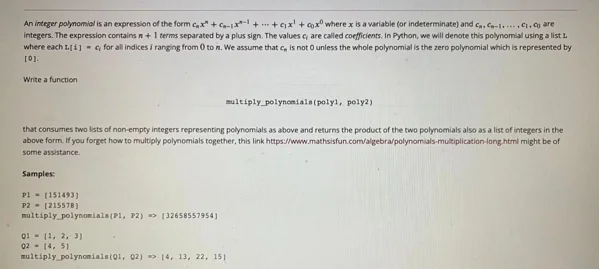
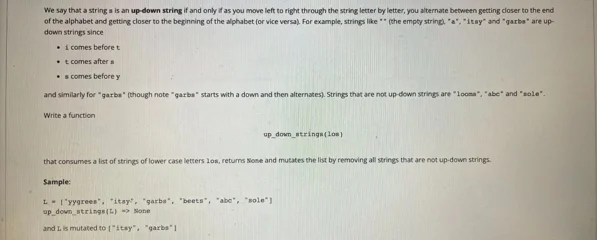
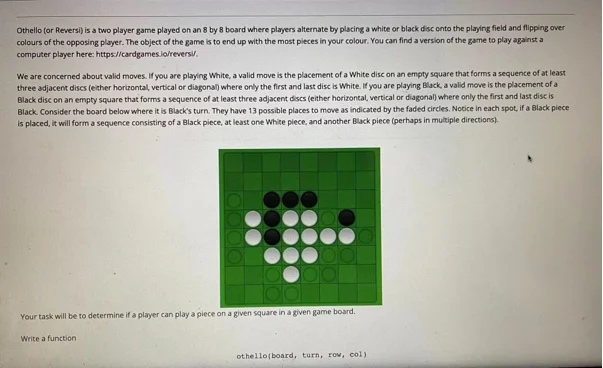
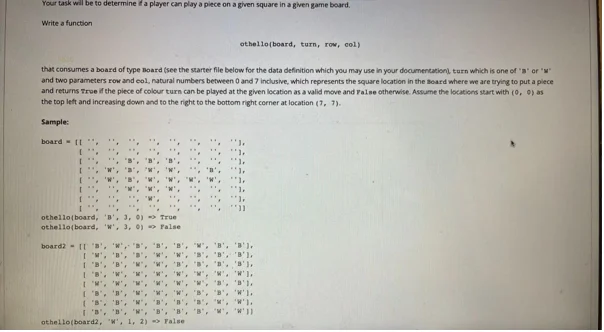
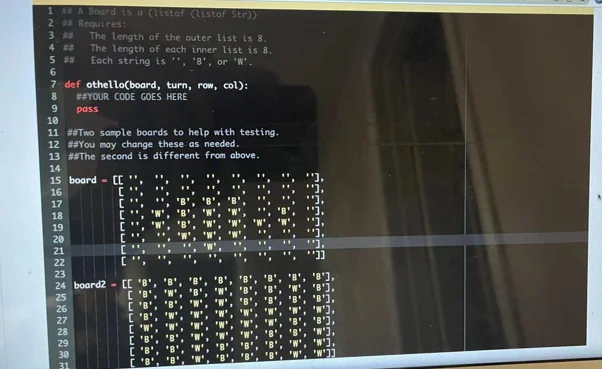
Source Code
QUESTION 1
def up_down_strings(los):
alpha = 'abcdefghijklomnpqrstuvwxyz'
for j in range(len(los)-1, -1, -1):
s = los[j]
prev = alpha.index(s[0]) - alpha.index(s[1])
is_ok = True
for i in range(1, len(s)-1):
curr = alpha.index(s[i]) - alpha.index(s[i+1])
if prev * curr >= 0:
is_ok = False
break
prev = curr
if not is_ok:
del los[j]
if __name__ == '__main__':
test = ['yygrees', 'itsy', 'garbs', 'beets', 'abc', 'sole']
up_down_strings(test)
print(test)
QUESTION 2
def othello(board, turn, row, col):
if board[row][col] != '':
return False
rows = len(board)
cols = len(board[0])
# down
step = 0
while True:
step += 1
if row + step >= rows:
break
if board[row+step][col] == '':
break
if board[row+step][col] == turn:
if step >= 2:
return True
else:
break
# up
step = 0
while True:
step += 1
if row - step < 0:
break
if board[row - step][col] == '':
break
if board[row - step][col] == turn:
if step >= 2:
return True
else:
break
# right
step = 0
while True:
step += 1
if col + step >= rows:
break
if board[row][col+step] == '':
break
if board[row][col+step] == turn:
if step >= 2:
return True
else:
break
# left
step = 0
while True:
step += 1
if col - step < 0:
break
if board[row][col - step] == '':
break
if board[row][col - step] == turn:
if step >= 2:
return True
else:
break
# right-down
step = 0
while True:
step += 1
if row + step >= rows:
break
if col + step >= cols:
break
if board[row+step][col+step] == '':
break
if board[row+step][col+step] == turn:
if step >= 2:
return True
else:
break
# left-down
step = 0
while True:
step += 1
if row + step >= rows:
break
if col - step < 0:
break
if board[row + step][col-step] == '':
break
if board[row + step][col-step] == turn:
if step >= 2:
return True
else:
break
# right-up
step = 0
while True:
step += 1
if row - step < 0:
break
if col + step >= cols:
break
if board[row-step][col+step] == '':
break
if board[row-step][col+step] == turn:
if step >= 2:
return True
else:
break
# left-up
step = 0
while True:
step += 1
if row - step < 0:
break
if col - step < 0:
break
if board[row - step][col-step] == '':
break
if board[row - step][col-step] == turn:
if step >= 2:
return True
else:
break
return False
if __name__ == '__main__':
board = [[ '', '', '', '', '', '', '', ''],
[ '', '', '', '', '', '', '', ''],
[ '', '', 'B', 'B', 'B', '', '', ''],
[ '', 'W', 'B', 'W', 'W', '', 'B', ''],
[ '', 'W', 'B', 'W', 'W', 'W', 'W', ''],
[ '', '', 'W', 'W', 'W', '', '', ''],
[ '', '', '', 'W', '', '', '', ''],
[ '', '', '', '', '', '', '', '']]
print(othello(board, 'B', 3, 0))
print(othello(board, 'W', 3, 0))
board2 = [['B', 'W', 'B', 'B', 'B', 'W', 'B', 'B'],
['W', 'B', 'B', 'W', 'W', 'B', 'B', 'B'],
['B', 'B', 'W', 'W', 'B', 'B', 'B', 'B'],
['B', 'W', 'W', 'W', 'W', 'W', 'W', 'W'],
['W', 'W', 'W', 'W', 'W', 'W', 'B', 'B'],
['B', 'B', 'W', 'W', 'W', 'B', 'B', 'W'],
['B', 'B', 'W', 'B', 'B', 'B', 'W', 'W'],
['B', 'B', 'W', 'B', 'B', 'B', 'W', 'W']]
print(othello(board2, 'W', 1, 2))
QUESTION 3
def multiply_polynomials(poly1, poly2):
m = max(len(poly1), len(poly2))
n = len(poly1) + len(poly2) - 1
result = []
for i in range(n):
result.append(0)
for i in range(len(poly1)):
for j in range(len(poly2)):
result[i+j] += poly1[i] * poly2[j]
return result
if __name__ == '__main__':
P1 = [151493]
P2 = [215578]
print(multiply_polynomials(P1, P2))
P1 = [1, 2, 3]
P2 = [4 ,5]
print(multiply_polynomials(P1, P2))
Similar Samples
Explore our sample solutions to get a glimpse of our expertise at programminghomeworkhelp.com. Our comprehensive, well-documented code examples showcase our ability to tackle diverse programming challenges across various languages and platforms. Trust our proficiency to help you excel in your programming courses.
Python
Python
Python
Python
Python
Python
Python
Python
Python
Python
Python
Python
Python
Python
Python
Python
Python
Python
Python
Python